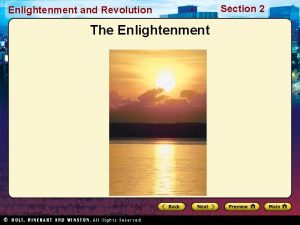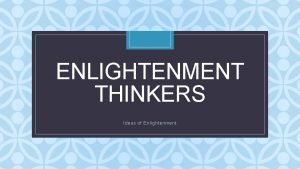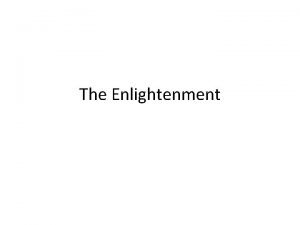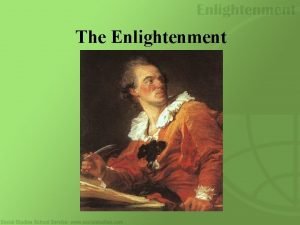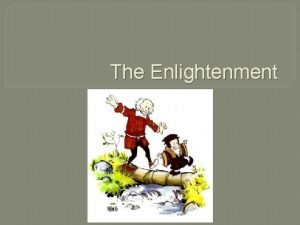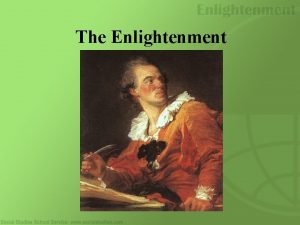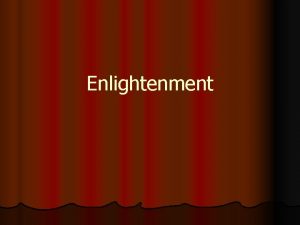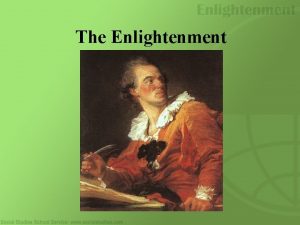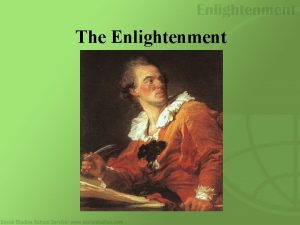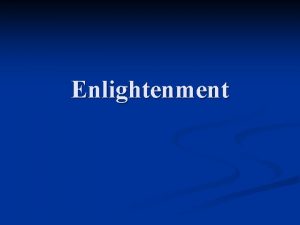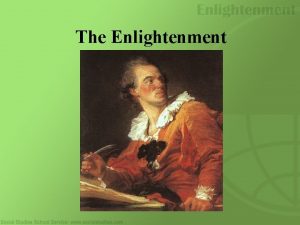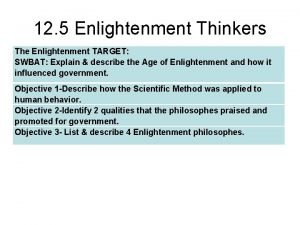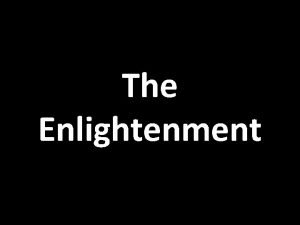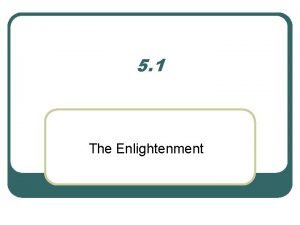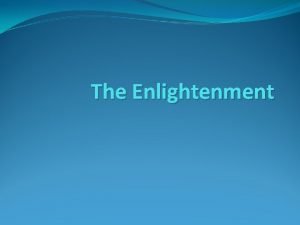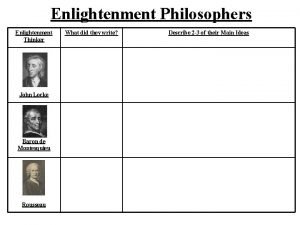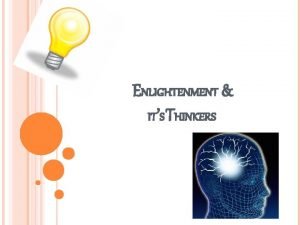The Enlightenment What Was the Enlightenment The Enlightenment







































- Slides: 39

The Enlightenment

What Was the Enlightenment? The Enlightenment was an intellectual movement in Europe during the 18 th century that led to a whole new world view.

According to the 18 thcentury philosopher Immanuel Kant, the “motto” of the Enlightenment was “Sapere aude! Have courage to use your own intelligence!” Immanuel Kant

Enlightenment Principles • • • The ability to reason makes humans unique Reason can be used to solve problems and improve lives The natural world is governed by laws that can be discovered through reason Like the natural world, human behavior is governed by natural law Governments should reflect natural laws and encourage education and debate

The Scientific Revolution The Enlightenment grew largely out of the new methods and discoveries achieved in the Scientific Revolution The equatorial armillary, used for navigation on ships

Francis Bacon and the Scientific Method n n Sir Francis Bacon Observation experimentation Testable hypothesis Document

Isaac Newton and the Scientific Method • • Used the scientific method to make a range of discoveries Newton’s achievements using the scientific method helped inspire Enlightenment thinkers Sir Isaac Newton

Religious Intolerance n Protestants and Catholics denounced each other as followers of Satan and people could be imprisoned for attending the wrong church or for not attending any.

Enlightenment Thinkers

René Descartes (1596– 1650) • French philosopher and mathematician • Questioned the basis of his own knowledge • “Cogito ergo sum” • “I think, therefore I am”

The French Salon and the Philosophes • Salons: gatherings for aristocrats to discuss new theories and ideas • Philosophes: French Enlightenment thinkers who attended the salons Madame de Pompadour

Voltaire (1694– 1778) • Most famous • Wrote plays, essays, poetry, philosophy, and books Attacked the “relics” of the medieval social order Championed social, political, and religious tolerance • • philosophe

The Encyclopédie • • 1 st Encyclopedia ever!! Begun in 1745; completed in 1765 Frontspiece to the Encyclopédie

The Encyclopédie (continued) • • Encyclopédie editor Denis Diderot and Jean Le Rond d’Alembert Banned by the Catholic Church

• • Deists believed in God but rejected organized religion Morality could be achieved by following reason rather than the teachings of the church Deism Lord Edward Herbert of Cherbury, founder of deism

Deism (continued) • Thomas Paine • The “great watchmaker ” Thomas Paine

Thomas Hobbes (1588– 1679) • Believed that humans were basically driven by passions and needed to be kept in check by a powerful ruler

John Locke (1632– 1704) n n Believed people were naturally happy, tolerant, and reasonable. Argued that all people were born equal with the natural rights of life, liberty, and property

Locke (continued) n n Treatises of Government Rights

Jean-Jacques Rousseau (1712– 1778) • • Philosophized that people were born good, and society corrupts them. Believed government should help everyone Everyone was equal People should give up certain freedoms to help others

Baron de Montesquieu (1689– 1755) • French thinker • Believed that if you separated the branches of government it would prevent an abuse of its power • Liked the British system of having a king, Parliament, and court system.

Montesquieu (continued) • Separation of powers • Constitutional monarchy Frontspiece to The Spirit of the Laws

Women and the Enlightenment • • • Mary Wollstonecraft Role of education Equality Disagreed with the idea that women should be at home cooking, cleaning, and raising children Olympe de Gouges

Wollstonecraft (continued) • • Education Women’s rights movement Title page of Wollstonecraft’s Thoughts on the Education of Daughters

The Enlightenment and the American Revolution • • Thomas Jefferson Influence of Locke, Montesquieu The Declaration of Independence

The Legacy of the Enlightenment n n n Government Society Education The signing of the U. S. Constitution

The Enlightenment and the French Revolution • • The American Revolution The Estates General The Marquis de Lafayette

“Enlightened Monarchs” n n n Most of Europe ruled by absolute monarchs Some were receptive to Enlightenment ideas Instituted new laws and practices Enlightened Monarchs • Frederick II, Prussia • Catherine the Great, Russia • Maria Theresa, Austria • Joseph II, Holy Roman Empire • Gustav III, Sweden • Napoleon I, France

Frederick the Great (ruled 1740– 1786) • Prussian ruler • Had a strong interest in Enlightenment works • Induced Voltaire to come to Prussia

Frederick the Great (continued) • Wanted to make Prussia a modern state • Reforms Painting titled “Frederick the Great and Voltaire. ”

Catherine the Great (ruled 1762– 1796) • • • Russian ruler Well-versed in Enlightenment works “Westernizing” Russia

Catherine the Great (continued) • • Domestic reforms Peasant revolt

Maria Theresa (ruled 1740– 1780) • • Austrian ruler Government reforms The serfs Son—Joseph II

Joseph II (ruled 1765– 1790) • • Ruled as coregent with his mother until 1780 Joseph’s reforms • Religious toleration • Control over the Catholic Church • Abolition of serfdom

Gustav III (ruled 1771– 1792) n n Swedish ruler Read French Enlightenment works Reforms Absolutism

Napoleon I • • • French ruler Military career Rise to power

Napoleon I (continued) • Reforms • • Education Law

The U. S. Constitution • • Separation of powers Checks and balances Painting depicting the Constitutional Convention

Olympe De Gouges • • • Criticized the French Government “Declaration of the Rights of Woman and the Female Citizen” Executed in 1793
 Sơ đồ cơ thể người
Sơ đồ cơ thể người Tư thế ngồi viết
Tư thế ngồi viết Công thức tính thế năng
Công thức tính thế năng Số nguyên tố là
Số nguyên tố là đặc điểm cơ thể của người tối cổ
đặc điểm cơ thể của người tối cổ Tỉ lệ cơ thể trẻ em
Tỉ lệ cơ thể trẻ em Các châu lục và đại dương trên thế giới
Các châu lục và đại dương trên thế giới ưu thế lai là gì
ưu thế lai là gì Phản ứng thế ankan
Phản ứng thế ankan Môn thể thao bắt đầu bằng chữ f
Môn thể thao bắt đầu bằng chữ f Thẻ vin
Thẻ vin Hát kết hợp bộ gõ cơ thể
Hát kết hợp bộ gõ cơ thể Cái miệng bé xinh thế chỉ nói điều hay thôi
Cái miệng bé xinh thế chỉ nói điều hay thôi Từ ngữ thể hiện lòng nhân hậu
Từ ngữ thể hiện lòng nhân hậu Trời xanh đây là của chúng ta thể thơ
Trời xanh đây là của chúng ta thể thơ Tư thế ngồi viết
Tư thế ngồi viết Giọng cùng tên là
Giọng cùng tên là Voi kéo gỗ như thế nào
Voi kéo gỗ như thế nào Thơ thất ngôn tứ tuyệt đường luật
Thơ thất ngôn tứ tuyệt đường luật Sự nuôi và dạy con của hổ
Sự nuôi và dạy con của hổ Thế nào là hệ số cao nhất
Thế nào là hệ số cao nhất Diễn thế sinh thái là
Diễn thế sinh thái là đại từ thay thế
đại từ thay thế Ng-html
Ng-html Vẽ hình chiếu vuông góc của vật thể sau
Vẽ hình chiếu vuông góc của vật thể sau Thế nào là mạng điện lắp đặt kiểu nổi
Thế nào là mạng điện lắp đặt kiểu nổi Mật thư anh em như thể tay chân
Mật thư anh em như thể tay chân Lời thề hippocrates
Lời thề hippocrates Vẽ hình chiếu đứng bằng cạnh của vật thể
Vẽ hình chiếu đứng bằng cạnh của vật thể Thang điểm glasgow
Thang điểm glasgow Quá trình desamine hóa có thể tạo ra
Quá trình desamine hóa có thể tạo ra Sự nuôi và dạy con của hươu
Sự nuôi và dạy con của hươu Các châu lục và đại dương trên thế giới
Các châu lục và đại dương trên thế giới Các loại đột biến cấu trúc nhiễm sắc thể
Các loại đột biến cấu trúc nhiễm sắc thể điện thế nghỉ
điện thế nghỉ Biện pháp chống mỏi cơ
Biện pháp chống mỏi cơ Bổ thể
Bổ thể Làm thế nào để 102-1=99
Làm thế nào để 102-1=99 Thiếu nhi thế giới liên hoan
Thiếu nhi thế giới liên hoan Phối cảnh
Phối cảnh








































